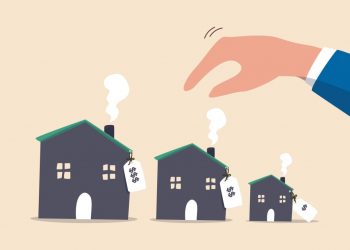RISMEDIA, May 26, 2009-Shock dealt by the market is laying the foundation for deep, long-term change where quick or temporary adjustments won’t do. Rocked to their core, consumers are saying a good-bye to frivolous expenditures. In fact, Americans say that even after the recession ends, their spending will return to just 86% of pre-recession levels, which equates to an approximate 10% drop, according to a new survey by AlixPartners LLP. On the savings front, the survey revealed that once the recession ends, Americans plan to save 14% of their total earnings, with the replenishment of their 401(k) and other retirement savings their biggest long-term concerns. In the end, this financial crisis may be recorded as a “generation-changing moment” where investors chose risk management over risky business.
To help adjust to and even prosper in this “reset” economy, Jeff Carbone, partner of Cornerstone Financial Partners, recommends the following:
1. Focus on personal economy. The quick-fix portfolio move should be replaced with a lengthened perspective by reviewing long-term goals. Instead of reacting to sensational headlines, consumers would do well to run some real numbers to determine where they stand.
Good decision making happens when a person feels confident in their current position. With unemployment soaring as the market slides, it’s more important than ever to maintain an adequate emergency fund. “Rather than the traditional three months of expenses, I suggest people have eight months in an accessible, liquid account – more if the recession puts your job at risk,” says Carbone. Naturally, it’s also crucial to limit consumer debt.
2. Reassess asset allocation. Especially when the stock market is down, it’s necessary to evaluate investment objectives and understand how they relate to risk tolerance and an investment timeline. Many investors are now deciding their portfolio requires additional building blocks. For instance, investors who were over-weighted in equities are looking to cash, real estate, and even alternative investments for the beneficial diversifying role they could play.
Also, whereas decades ago, investors began with equities and then built a defensive wall with fixed income and cash, many investors close to retirement now lead with the need to protect their nest egg. No longer able to count on an up market and rising home values, risk management is now center stage. According to Carbone, “If you first make allocations to cash and fixed income to provide a line of defense, it likely will be easier to commit to the longer time period required to potentially profit from your equity investments.” At the same time, younger investors are hearing that the down market presents an unprecedented buying opportunity. A lot of good companies are on sale right now, so it may be a good time for younger investors to increase their equity exposure from 20% to 40%, or in some cases 40% to 60%.
3. Think long-term. Nowhere is patience more necessary than in the real estate market. Although bargain basement prices and tax credits are dangling in front of renters, the recession has changed the real estate playing field and the home financing market has transformed. Consumers in the market for a mortgage need a secure job and a good FICA score in order to meet lenders’ strict income and credit requirements. Be ready, too, to come up with a higher down payment than was required a few years ago. “And you should buy a home only if you intend to live there for seven to ten years,” says Carbone. “It may now take that long to appreciate in value.”










